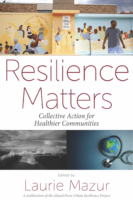 For those who care about sustainability and equity, 2022 brought plenty of good news. Notably, the Biden Administration is rolling out its Justice40 initiative, which targets 40 percent of certain federal investments to disadvantaged communities. Through the Inflation Reduction Act, Bipartisan Infrastructure Law, and the American Rescue Plan, money is — finally — flowing to climate change mitigation and resilience in hard-hit communities.
For those who care about sustainability and equity, 2022 brought plenty of good news. Notably, the Biden Administration is rolling out its Justice40 initiative, which targets 40 percent of certain federal investments to disadvantaged communities. Through the Inflation Reduction Act, Bipartisan Infrastructure Law, and the American Rescue Plan, money is — finally — flowing to climate change mitigation and resilience in hard-hit communities.
But the devil, as they say, is in the details. Now that more funding is available, it’s important to make sure it is spent wisely and goes where it’s needed most. In 2022, contributors to the Island Press Urban Resilience Project dug into the details, devising concrete plans for collective action to build a fairer, greener future.
Georgetown Climate Center’s Mark Rupp, for example, shows how all federal infrastructure spending can be leveraged to boost climate resilience. However, many working-class communities of color lack the resources to navigate the process of applying for federal funds. That’s why we profiled the Justice40 Accelerator, an innovative project that builds the capacity of community-based groups to apply for — and make good use of — federal funding.
At all levels, policymakers are confronted with intersecting crises, including climate impacts and a shortage of affordable housing. Governments need to do more with less, by investing in strategies that accomplish many goals at once. For example, Kimberly Lyle and Joe Kriesberg offer a plan to boost funding for affordable housing and climate resilience, through progressive real estate tax reform. It’s an approach Beth Sawin calls “multisolving,” examples of which include “green infrastructure” like urban forests that provide cooling shade and flood control.
In the wake of the racial reckoning that followed George Floyd’s murder, our contributors have also explored, in detail, what authentic racial equity requires. In her powerful essay, Reckoning and repair in America’s cities, Liz Ogbu describes several cities’ efforts to “account for the past, reckon with the arc of harm and benefit, and create a pathway to repair.” We also explored proactive efforts to prevent racial inequities, notably the Equitable Building Electrification Fund, which seeks to ensure that the economic and environmental benefits of electrification accrue equally in marginalized communities.
In 2022, we deepened our coverage of the health/climate nexus. That’s because the climate crisis is also a health crisis: on a warming planet, disasters take an ever-growing toll in lives and well-being. Moreover, phasing out climate-changing fossil fuels would yield staggering health benefits. As Gary Cohen and Kalpana Ramiah observe, “eliminating fossil fuel pollution in the United States could save 100,000 lives and $880 billion annually.” They add that, over the long term, “air quality improvements alone could substantially offset, or even exceed, the costs of climate change mitigation.” Talk about multisolving!
At the same time, in our polarized national discourse, health professionals remain trusted messengers on climate change and its impacts. To amplify their voices, we have forged a partnership with the Medical Society Consortium on Climate and Health’s Climate Health Equity Fellowship. The fellowship “empowers doctors of color to become leaders in climate and health equity education, advocacy, and policy solutions.” In 2022, we worked with the fellows to craft nine op-eds on wide range of topics — from the risks of extreme heat to the need for electric school buses — which were published in the doctors’ hometown news outlets.
In these pages, you’ll find plenty of detailed strategies to build on 2022’s good news. There are plans to extend flood insurance to low-income families, fund efficiency upgrades to old buildings, design healthful, climate-resilient schoolyards, and more. In our shared quest to build a world that is sustainable and equitable, the devil is always in the details. As opportunity arises and money flows, our contributors are focused on getting those details right.
Visit islandpress.org/resilience to download a free copy of Resilience Matters.





